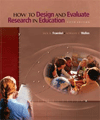 |  How to Design and Evaluate Research in Education, 5/e Jack R. Fraenkel,
San Francisco State University
Norman E. Wallen,
San Francisco State University
Nature of Educational Research
Main PointsWhy Scientific Research Methodology is of Value - The scientific method provides an important way to obtain accurate and reliable information.
Ways of Knowing - There are many ways to obtain information, including sensory experience, agreement with others, expert opinion, logic, and the scientific method.
- The scientific method is considered by researchers the most likely way to produce reliable and accurate knowledge.
- The scientific method involves answering questions through systematic and public data collection and analysis.
Types of Research - Some of the most commonly used scientific research methodologies in education are experimental research, correlational research, causal-comparative research, survey. research, content analysis research, qualitative research, and historical research.
- Experimental research involves manipulating conditions and studying effects.
- Correlational research involves studying relationships among variables within a single group, and frequently suggests the possibility of cause and effect.
- Causal-comparative research involves comparing known groups who have had different experiences to determine possible causes or consequences of group membership.
- Survey research involves describing the characteristics of a group by means of such instruments as interview schedules, questionnaires, and tests.
- Ethnographic research concentrates on documenting or portraying the everyday experience of people using observation and interviews.
- Ethnographic research is one form of qualitative research. Another common form of qualitative research involves case studies.
- A case study is a detailed analysis of one or a few individuals.
- Content analysis research involves the systematic analysis of communication.
- Historical research involves studying some aspect of the past.
- Action research is a type of research by practitioners designed to help improve their practice.
- Each of the research methodologies described constitutes a different way of inquiring into reality and is thus a different tool to use in understanding what goes on in education.
General Research Types - Individual research methodologies can be classified into general research types. Descriptive studies describe a given state of affairs. Associational studies investigate relationships. Intervention studies assess the effects of a treatment or method on outcomes.
- Quantitative and qualitative research methodologies are based on different assumptions; the purpose of research, the methods used by researchers, the kinds of studies undertaken, the researcher's role, and the degree to which generalization is possible.
- Meta-analysis attempts to synthesize the results of all the individual studies on a given topic by statistical means.
Critical Analysis of Research - Critical analysis of research raises basic questions about the assumptions and implications of educational research.
The Research Process - Almost all research plans include a problem statement, an exploratory question or hypothesis, definitions, a literature review, a sample of subjects, instrumentation, a description of procedures to be followed, a time schedule, and a description of intended data analyses.
|
|



 2003 McGraw-Hill Higher Education
2003 McGraw-Hill Higher Education